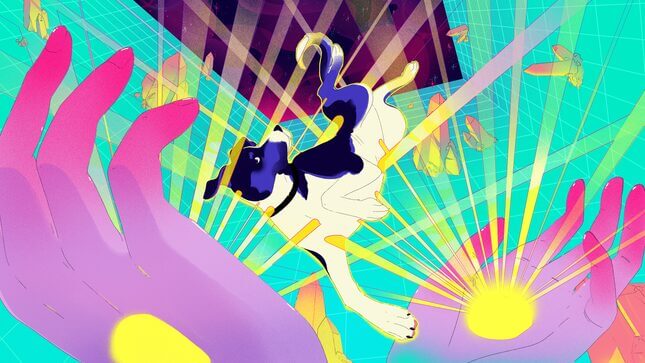Frankie, Relax: A Dog Goes to Reiki
Health
Illustration: Chelsea Beck
On a recent Saturday afternoon, Cynthia, a reiki practitioner, was laying her hands on my dog, an incredibly anxious two-year-old hound mix who sat fidgeting between the two of us, utterly oblivious to what was about to happen to her for the next 40 minutes of her life. The noise and traffic of the busy Manhattan street below us filtered up into her second-floor studio, but Cynthia’s eyes were intensely focused on something beyond what could be perceived by our five senses, her hands two inches in front of Frankie’s chest. What felt like minutes passed before Cynthia proclaimed, “She has a nice heart energy.”
Frankie leapt off the futon and ran to the window, perhaps in a futile effort to escape. Realizing there was no out, she returned to us, and to reiki.
A reasonable question to ask here is, what the fuck is my dog doing at reiki, the benefits of which have been widely debunked? To which my response would be, that’s a very good and appropriate question. That I can bring Frankie to reiki is a sign of just how much wellness—that vague catch-all for practices that signal you don’t just care about being healthy and free of disease, but that you care about optimizing your life to meet some sort of maximum potential—has bled over from the strictly human realm and into that of our pets. And why not! Our pets, after all, are no longer just pets qua pets—they’re our “furbabies,” our children (or put another way, a mirror for our own aspirations and self-image), whom we’re increasingly willing to lavish with our love, our attention, and our money.
Accordingly, the Pet Industrial Complex is now cashing in, having realized that wellness warriors are eager to include their pets in the pursuit of both physical and spiritual health. Does your dog have anxiety or depression? You can take them to a psychiatrist who may prescribe them a dog-sized dose of Xanax. Enter any pet store and you’re likely to run into an entire display of CBD-infused treats, marketed as panaceas for everything from stress to joint pain; acupuncture is now offered at an increasing number of veterinary practices nationwide. In this light, it makes sense for reiki to be an option, if not exactly popular, for people with entirely too much disposable income who fret that their beloved Sadie or Max is unhappy or unwell or both, and not living their best possible life.
Dogs have been thoroughly Goop’ed. This is not exactly a new phenomenon—as early as 2007, a veterinarian spoke positively about reiki’s benefits for animals. “I can’t say anything about the communication elements, but I’ve heard a lot of good things about reiki,” she told the New York Times. “The lymphatic system, blood flow, neurons—the body’s health is all about energy flow and making sure it’s unblocked.”
The International Center for Reiki Training describes it as a type of “healing” administered by “laying on hands” that is “based on the idea that an unseen ‘life force energy’ flows through us and is what causes us to be alive.” Reiki as we know it today was the brainchild of Mikao Usui, a Japanese man who in the 1920s climbed a mountain where, as a monument to him claims, on the 21st day he “felt a great REIKI over his head, and at the same time as he was spiritually awakened he acquired the REIKI cure.” According to reiki’s standard hagiography, the practice first spread to the United States in the 1940s, but it truly entered the mass consciousness decades later with the help of snake oil peddlers like Dr. Mehmet Oz, whose wife Lisa is a “reiki master.” Dr. Oz has enthusiastically promoted reiki on his show as well as in the surgical operating room, calling it one of his favorite alternative medicine “secrets.” But it’s not just Dr. Oz who has embraced the dubious practice—while reiki’s most enthusiastic fans tend to be exactly who you’d expect, even cancer wards like the one at Memorial Sloan Kettering now offer reiki to their patients, and some home care agencies have flirted with using reiki as a therapy for dementia patients, with what they have said are positive results.
When I called Cynthia to set up an appointment and told her that Frankie is a “neurotic ball of anxious energy,” she pronounced that my dog was a “perfect candidate” for reiki. “It’ll balance everything out and help her release anxiety,” she said, adding somewhat cryptically, “If you’ve studied anything or heard about quantum physics, that’s how everything works.”
I am not a believer in reiki; I find most practices marketed as wellness inherently suspect—but what I am is curious about what drives people to take their dogs to see, of all people, a reiki practitioner.
-

-

-

-

-

-

-

-

-

-

-

-

-

-

-

-

-

-

-

-

-

-

-

-

-

-

-

-

-

-

-

-

-

-

-

-

-

-

-

-








































